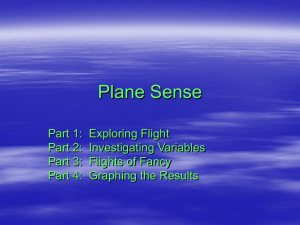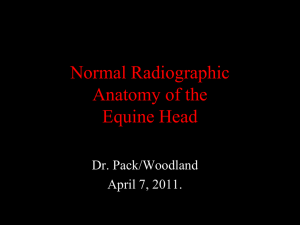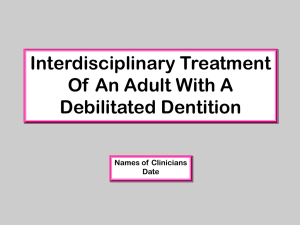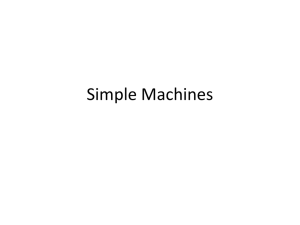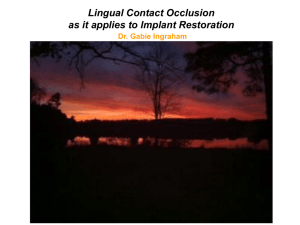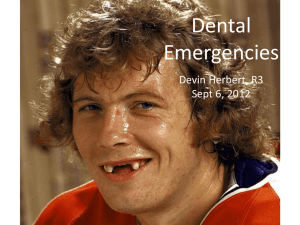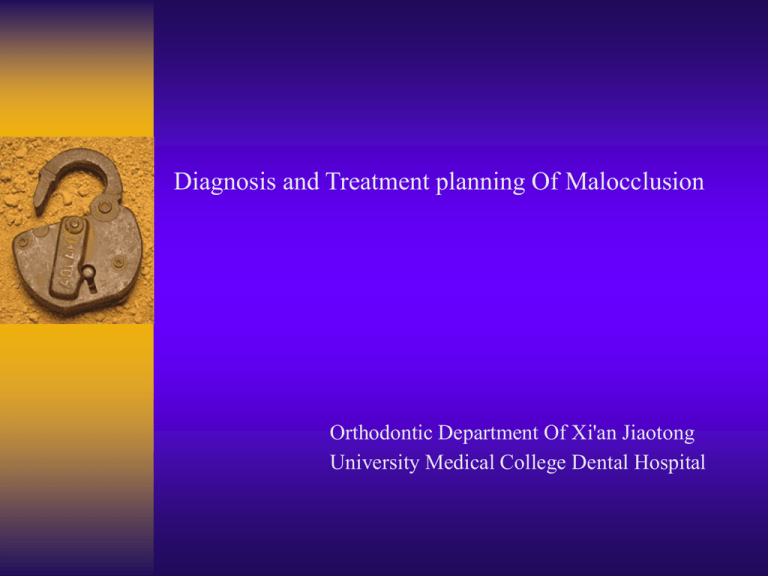
Diagnosis and Treatment planning Of Malocclusion
Orthodontic Department Of Xi'an Jiaotong
University Medical College Dental Hospital
Diagnosis Of Malocclusion
Accurate diagnosis of Orthodontic problems comes
from the detailed clinical examination, data analysis and
comprehensive evaluation. The correct treatment program
can be planed after an adequate diagnosis of
malocclusion. Therefore, the correct diagnosis and
treatment plan of Orthodontic problems play an important
role in the whole treatment process.
Interview
Clinical Exam
Analysis of Dx Records
Classification
Diagnosis (Problem list )
Database
Pathology (caries, perio, etc.)
Control before orthodontic treatment
Interaction compromise cost/benefit other
factors
Orthodontic problems
possible solution
treatment plan
concept
Priority order, A, B, C, D, etc
Patient parent Consult
Treatment goals
Treatment plan details
1. Clinical examination
Patients with the general situation :
Including the patient's name, sex, nationality, date of
birth, birthplace and occupation information.
Chief complaint and medical history
Chief Complaint: Patient's chief complaint of all
orthodontic treatment are the basic starting point, usually
treatment plan begins to develop according to the chief
complaints of patients.
History: including past history, present history and
genetic history
Chief complaint and medical history
1. The Jaw’s traumatic may cause temporomandibular joint
adhesions, so it could be difficult for jaw to move and develop.
2. Dental trauma may cause the teeth adhere to the alveolar bone,
so it makes the tooth move difficult.
3. long-term Systemic chronic dyspepsia may affect the normal
bone tissue reconstruction in the movement of the teeth, which
may lead to the loosening of mobile teeth.
Clinical examination
Facial examination
Facial profile
from the Height of facial to points: a long face, short face,
normal face.
From the surface profile of the degree to sub-process: straight,
convex , concave .
Symmetry
To the hypothetical median sagittal plane for the evaluation of the
baseline, normal, nasal ridge, nasal tip, upper lip beads, submental
vertex, arch basically located in the center line on this plane. Right
and left eyes, ears, zygomatic process, nose, mouth, mandibular
angle and a corresponding symmetrical teeth are symmetrical.
facial Ratio
Vertical ratio
left and right ratio
Evaluation of facial : photographs, body measurements, Xcephalometry
Profile type
The profile is divided into before and after the relative position
according to the soft tissue glbella, the nose, pogonion of soft :
straight type, concave type, convex type
Dentition examination
a, The development stage of occlusion: deciduous , dentition,
permanent occlusion. The relationship between occlusion and
age. Development of teeth and condition. Replacement of teeth,
the tooth-loss situation.
b, the basic situation of dentition: the number, shape, size, color,
developmental status and caries status of the teeth.
c, abnormal dentition parts: the part of crowded, misplaced,
reversing, the open bite occlusion, lock bite occlusion and other
malformations.
Dentition examination
d, molar relationship: Class I, II, III category of relations,
also known as the neutroclusion, distoclusion and mesioclusion.
the two latter can be divided into full and cusp-cusp relationship
e, canine relationship: can also be divided into the
neutroclusion, distoclusion and mesioclusion.
f, anterior relationship: Overbite Over jet
Class I
Class II
Class III
Overbite
normal:1/3
1/2>I度>1/3
2/3>II度>1/2
III度>2/3
1/3
Over jet
Normal:3.0mm
I度 3-5 mm
II度 5-8 mm
III度 > 8 mm
牙列的检查
g、 牙周情况
Slight periodontal loss: loss of attachment < 1/4
of the root length
Moderate periodontal loss: loss of attachment
1/4 to 1/3 of the root length
Severe periodontal loss: loss of attachment >
1/3 of the root length
Severe complicated periodontal loss: loss of
attachment > 1/3 of the root length combined
with intra -osseous defect.
h、Spee`s曲线
Spee`s曲线
Oral function and temporomandibular joint
a, opening /closed type and the opening /closed degree
b、CR-CO
c, tongue function
d, masticatory function
e, swallowing function
f, the pain and Snapping of temporomandibular joints
Physical growth evaluation
We should have a clear understanding for each patient's
growth and development status, as the same abnormal
performance, when the growth and development status is not
the same, the treatment methods used may be different.
Evaluation of growth and development mainly relies on the
physiological characteristics of patients, such as the bone age,
the dental age and the secondary sexual characteristics.
A radiograph of the hand and
wrist
Far from the middle section of the
middle finger epiphysis
The medial sesamoid of thumb
Radial epiphysis
Body height
Body height
Psychological Situation
In recent years, orthodontic patients at the psychological
situation increase gradually. The patients which exist psychological
situation usually exceed the normal requirements of the scope in
the treatment, and he could be very sensitive about the existence of
malocclusion, exaggerate in understanding the abnormal
performance, be urgent for treatment and require a higher treatment
sometimes exceeding the normal scope.
Oral health assessment (dental caries, gingivitis, periodontal
disease, etc.)
Orthodontic appliance will reduce the function of selfcleaning, the existed dental caries, gingivitis, etc must be
treated before the appliance fixed to the teeth, otherwise the
development of the disease may be aggravated.
Second, cast analysis
the role of study cast at orthodontic treatment:
1. Record real teeth, alveolar bone, the palate and the base bone
morphology and location.
2.Dentofacial deformity analysis conducted
3. Comparison in the course of treatment
4. Compared the efficacy before and after treatment
5.One of the essential legal basis
The requirements for study cast
1. The cast should be extent possible, the extension of the maximum
displacement of the soft tissue can reflect the situation in bone matrix.
Generally it doesn’t carry out amendments to the soft tissue. The cast
should include teeth, alveolar process, based bone, transitional fold, hard
palate and lace cap, backwards be included maxillary tuberosity and molar
pad nodule.
2.Cast must be accurate, clear and beautiful, and be able to reflect the
patient's occlusion.
Cast Analysis
Cast analysis
Arch Length analysis: arch length is divided into three
sections, the previous length, the middle of the length and
posterior segment length. Arch Perimeter
dental space Analysis :
Arch Required
Arch Available
Arch space= Arch Required - Arch Available
·
A
B
A the previous length,B the middle of the length and
Cast Analysis
Cast analysis
Mixed dentition space analysis
prediction of Arch Required
estimation from radiographs
estimation from Moyertables
Tanaka-Johnston prediction method
Arch Available measurement
Estimation from radiographs
The space between the demand for the four incisor according
to their distance from mesial to distal .
Uneruption of canine, premolar measurements
x=
y₁
Conventional space analysis does not include the location of lateral
incisor and profile.
Analysis only shows the lack of coordination, do not reveal the
location of coordination.
Moyer prediction table
Use four mandibular incisor to estimate the distance of
lower , the maxillary canine, premolar from mesial to distal .But
this estimate has a tendency to over-estimate.
Low incisor
maxillary
mandibular
19.5 20.0 20.5 21.0 21.5 22.0
20.6
20.9 21.2
21.3 21.8 22.0
20.1
20.4 20.7
21.0 21.3 21.6
Tanaka and Johnston预测法
Mandibular canine and premolars in one quadrant
can be calculated by adding 10.5 mm to half of the
measured mesiodistal width of the four mandibular
incisors.
下颌:2112+10.5 = 345
Maxillary canine and premolars in one quadrant can
be determined by adding 11.0 mm to half of the
measured mesiodistal width of the four mandibular
incisors.
上颌:2112+11.0 = 345
Tanaka and Johnston预测法
Mandibular canine and premolars in one quadrant
can be calculated by adding 10.5 mm to half of the
measured mesiodistal width of the four mandibular
incisors.
manibular:2112+10.5 = 345
Maxillary canine and premolars in one quadrant can be
determined by adding 11.0 mm to half of the measured
mesiodistal width of the four mandibular incisors.
maxillary:2112+11.0 = 345
Cast Analysis
Bolton Index
Bolton index refers to the former upper and lower teeth crown
width ratio of the sum of all relations and with the upper and lower
dental arch crown width ratio of the sum. Bolton index used to
diagnose patients with upper and lower teeth do not tune the width
of the problem.
Anterior than = 6 mandibular anterior teeth crown width / 6
maxillary anterior teeth crown width
all teeth than = 12 mandibular tooth crown width / 12
maxillary teeth crown width × 100%
The discrepancy of Bolton index may cause the malocclusion of
anterior teeth, such as overcrowding, deep overbite ,deep over jet and
so on.
Bolton Analysis
Model Analysis
curves of Spee
Measurement Methods: The ruler placed on the side of
mandibular incisor teeth with the last mandibular molar on the
cuspal, measure the distance between the lowest point and the
ruler. Both sides of the measured value divided by the sum of
two, plus 0.5mm is the correct curve of Spee `s required by the
space.
Spee`s曲线
Curve of Spee
Flat
Deep
Model Analysis
Analysis of dental arch symmetry
Palate wrinkle method: In the first wrinkle on the palate and the last
one to take the midpoint, make the connection between the two
points and extended to measure both sides of the dental arch distance
from this line to diagnose the dental arch symmetry.
Coordinate Measuring : Coordinates the center line of plate
aligned with the palate raphe, then measures both sides of the
teeth before and after the location of buccolingual position.
Model Analysis
Width evaluation
Arch width can be divided into three parts:
The preceding width (inter-canine width)
Middle arch width (first premolar width of the central
inter-nest)
Posterior segment arch width (the first permanent
molars between the width of the central nest)
the preceding width
Middle arch width
Posterior segment arch width
Model Analysis
Pont's index
1909 Pont made an ideal arch width of the prediction
methods. with the sum of four maxillary incisors divided by first
premolar and first permanent molars, in the multiplied by 100, to
arrive at a fixed index.
Pont's index is Obtained as follow
(S)×100 /80 = Ideal interpremolar width
(S)×100 /64 = Ideal intermolar width
(S)=sum of the diameters of the four maxillary incisors
Pont `s index
上和四个切
牙宽度之和
理想第一前
磨牙间宽度
理想磨牙
间宽度
上和四个切
牙宽度之和
理想第一前
磨牙间宽度
理想磨牙
间宽度
18
22.5
28.1
28.5
35.5
44.5
20
25
31.94
29
36
45.3
20.5
25.5
32
29.5
37
46
21
26.25
32.82
30
37.5
46.87
21.5
27
33.27
30.5
38
47.6
22
27.5
34
31
39
48.4
22.5
28
35
31.5
39.5
49.2
23
28.75
35.94
32
40
50
23.5
29.5
36.88
32.5
40.5
50.8
24
30
37
33
41
51.5
24.5
30.5
38
33.5
42
52.3
25
31
39
34
43
53
25.5
32
39.8
34.5
43.5
53.9
26
32.5
40.9
35
44
54.5
26.5
33
41.5
36
45
56.4
27
33.5
42.5
37
46.25
57.8
27.5
34
42.96
28
35
44
Model Analysis
alveolar bone Analysis :
Base bone: mandibular arch formed, namely, dental
periapical alveolar arch. base bone is stable based alveolar
bone, and won’t change due to the tooth’s movement or loss.
Alveolar bone: It is the bone tissue which is on the top of the
base bone surrounding the teeth. It is between the teeth crown
and the base bone. Alveolar bone may change due to the
tooth’s movement or loss.
Model Analysis
Diagnostic set -up
Cutting down each tooth which will be on the
malocclusion crowded model and arrange with an ideal
location in order to diagnose if the adequacy of base
bone length to accommodate existing teeth. And then
decide whether or not to extract tooth and predict the
location of tooth movement and direction, showing
efficacy.
Model Analysis
The step of diagnostic set –up
1) Make an accurate record of occlusal relations, marking a
centerline.
2) Marked all the teeth with pencil .
3) To saw along the contact point, not damage tooth crown
width.
4) To saw all the teeth at the same level of the root side.
5) Rearrange the sawed teeth according to dental arch size
and shape of the teeth as the treatment plan says, and fix with
sticky wax.
Three, X-cephalometry
X-cephalometry is a study method by the United
States of Broadbent and Germany in the 30's .The
method used to study Hofrath Craniofacial Growth
and malocclusion combined with bone disorders.
The modern theory about growth and development
comes from the majority study of x-cephalometry.
X-线头影测量的发展
1920, Dr B.Holly Broadbent Sr interesting in the
face change by Angle`s treatment. Dr T Wingate
Todd had collected many skulls and had used Todd
craniostat to measure human face.
1924, Broadbent transformed Todd craniostat into
first craniometer by adding a metric scale.
Todd emphasized investigation must be performed
on health living children.
During these years of skeletal study, lateral jaw and
craniofacial radiographs were made by Todd, Hill
and Thomas, while Broadbent used it in clinic.
X-cephalometry applications.
Craniofacial growth and development in the study,
based on the method will soon be used to evaluate the
craniofacial morphology, the proportion of the
anatomical distinction between basic mistake occlusion.
Through the x-cephalometry study, it is recognized that
most of the mistake occlusion jaw position and the teeth
are compensatory or the result of the interaction
between adaptation. The location of possible jaw
disorders through the teeth to achieve the normal
compensatory .
X-cephalometry applications.
Normal bone was found on the teeth can also occur
malocclusion. Moderate bone disorders with moderate
dental disorders can become a serious malocclusion ,
therefore, in the tooth model on the same mistake
appears malocclusion , probably completely different in
the x-ray analysis, the patient may have a completely
different facial type.
X-cephalometry applications.
X-cephalometry study are the clinical treatment course
of teeth, jaw, face changes in the primary means of
treatment before, during and after filming ,a series of xray film to overlap to study changes in the location of
mandibular teeth. However, such changes include the
both parts about growth ,development and treatment .At
present , it is very difficult to determine which are part
of the growth and development, which are treatment
according to the current knowledge and technology.
X-cephalometry applications.
In addition to analyzing the relationship between different
periods of time outside of the craniofacial, x-cephalometry
also the prediction for the growth and development, it is
estimated that the future growth of the facial trend-type. If
the prediction and treatment of unforeseen changes in the
framework will result in combined treatment plan, or
blueprint known as the orthodontic treatment - VTO,
become a specific therapeutic purposes. Thus promote the
development of x-rays cephalometry analysis.
X-cephalometry applications.
In order to achieve X-cephalometry individuals
comparing with similar groups, it is necessary to
establish the same race, same sex, same age the
average measured value. Downs suggest a xcephalometry analysis methods in 1948, and set up
a normal average.
X-cephalometry applications.
X - cephalometry analysis can be divided into five
functional parts: cranial, skull base, maxillary bony
maxillary dentition, mandible and mandibular dentition.
Analysis of the five parts of each other in the horizontal,
vertical upward relations. Modern X-cephalometry is a
method designed to describe the relationship between
these functional units. It is generally believed that there
are two ways to analyze a measurement and analysis.
X-cephalometry applications.
General There are three main types of view measurement
method.
⑴ Linear measured : measured cephalometric tracing film
or the distance between two points and compare the distance
directly or in the proportion way.
⑵ angle measured: measured the angles between
intersecting lines, the advantages of this measurement is it
doesn't use the ratio to avoid the individual differences.
⑶ arc measurements: draw a series of arc to evaluate the
location of anatomical structures.
X-cephalometry applications.
Another way is to use graphics to express the normal data,
rather than a series of measurements. Directly to the patient's,
edentulous patients with normal graphics through the template
for comparison. The early x-cephalometry consider a normal
graphics more easily recognizing the type of relationships. Dr.
Moorrees `s Mesh are raised in the 60's with the performance of
the grid to the patient's disorder. However, at that time because
this method does not clearly establish normal relations, while not
widely accepted. However, in recent years, with the development
of the computer application, the normal template set up, such a
direct comparison of the template has been adopted as an
analytical method.
X-线投影测量的基本知识
Lateral and frontal head radiographs
1 Head in a fixed position in a cephalometer
2 Head hold by ear rods.
3 X-ray direction is at right angle to sagittal
plane of the head when profile film taken.
4 PA view, frontal plane of the head is
perpendicular to the x-ray beam.
5 The film cassette is as close as possible to
the face.
the basic knowledge of X-cephalometry
Lateral and frontal head radiographs
A standard distance of 60 inch from
source of radiation to midsagittal plane.
Film to midsagittal plane according
head size, they used vernier scales to
correct enlargment.
basic components of X-cephalometry system's : X-ray equipment,
X-ray film devices, the head positioning device.
The basic knowledge of X-cephalometry
X-ray device (tube)
Components: X-ray tube, transformers, filters,
parallel-ray tube, cooling system.
X-ray have the three basic conditions, cathode,
anode and power
Cathode composition: tungsten target, Copper
Rods
Cathode composition: tungsten wire, condenser
Cup
变压器(高压)
铝盘
铅隔板
聚光杯
乌丝 乌靶
变压器(低压)
阴极
阳极
The basic knowledge of X-cephalometry
Minimize error when serial films of same
individual are taken at different times.
to permit universal use of cephalometric
data obtained from many different source.
Possible errors:
1 a lack of perpendicularity of the X-beam to
midsagittal plane and the film surface.
2 The film is not in closest place to head and
face for minimizing enlargement.
The basic knowledge of X-cephalometry
Safety feature of the cephalometric technique
- Use of the 90-kv peak to minimize softer xrays.
- The beam is filtered to remove softer x-rays
- The film is a double-emulsion film
- A cassette with compatible intensifying
screens.
- Patient and operating personnel protection
X-ray protection
Utilization of high speed film and
intensifying screen in order to reduce the
dose of radiation and exposure time
Filtration of secondary radiation
Collimation by a diaphragm
Proper exposure technique and
processing
The patient`s wearing a lead apron
Landmarks and Tracing
Three components of analysis are analysis of
the skeletal features of the patient, the dental
features and the profile of the patient.
Tracing steps
1 Soft profile, external cranium, vertebra
three crosses for registration.
2 cranial base, internal border of cranium,
frontal sinus, and ear rods.
3 Maxilla and related structures.
4 Mandlbe
Landmarks and Tracing
Notes
1 Tracing as much anatomy as possible,
especially in skull base area.
2 Know definition of the landmarks clearly
3 Know the variation of some landmarks
location.
4 When left and right are two lines, trace the
two lines and use the average with broken
line.
5 repeat of the tracing as same for severe times.
Landmarks and Tracing
Sella (S)
The geometric center of
the pituitary fossa (sella
turcica), determined by
inspection constructed
point in the midsagittal
plane. (midsagittal)
Landmarks and Tracing
Nasion (N, Na)
The intersection
of the internasal
and frontonasal
sutures, in the
midsagittal plane.
(midsagittal)
Landmarks and Tracing
Porion (Po)
The most superior point of
the outline of the external
auditory meatus
("anatomic porion").
When the anatomic
porion cannot be located
reliably, the superior-most
point of the image of the
ear rods ("machine
porion") sometimes is
used instead. (bilateral)
Landmarks and Tracing
Anterior nasal spine (ANS)
The tip of the bony
anterior nasal spine at the
inferior margin of the
piriform aperture, in the
midsagittal plane. It
corresponds to the
anthropological point
acanthion and often is
used to define the anterior
end of the palatal plane
(nasal floor). (midsagittal)
Landmarks and Tracing
A-point (Point A, Subspinale, )
The deepest (most posterior) midline
point on the curvature between the ANS
and prosthion. Its vertical coordinate is
unreliable and therefore this point is used
mainly for anteroposterior measurements.
The location of A-point may change
somewhat with root movement of the
maxillary incisor teeth. (midsagittal)
Landmarks and Tracing
B-point (Point B, Supramentale, sm)
The deepest (most posterior) midline
point on the bony curvature of the
anterior mandible, between infradentale
and pogonion. (midsagittal)
Landmarks and Tracing
Pogonion (Pog, P, Pg)
The most anterior point on
the contour of the bony
chin, in the midsagittal
plane. Pogonion can be
located by drawing a
perpendicular to
mandibular plane, tangent
to the chin. (midsagittal)
Landmarks and Tracing
Gnathion (Gn)
The most anterior
inferior point on the
bony chin in the
midsagittal plane.
(midsagittal)
Landmarks and Tracing
Menton (Me)
The most inferior
point of the
mandibular
symphysis, in the
midsagittal plane.
(midsagittal)
Landmarks and Tracing
Gonion (Go)
The most posterior
inferior point on the
outline of the angle of
the mandible. It may be
determined by
inspection or it can be
constructed by bisecting
the angle formed by the
intersection of the
mandibular plane and
the ramal plane and by
extending the bisector
through the mandibular
border. (bilateral)
Landmarks and Tracing
Orbitale (Or)
The lowest point on the
inferior orbital margin.
(bilateral)
Soft tissue landmarks
Landmarks and Tracing
Soft tissue glabella (G)
The most
prominent point of
the soft tissue drape
of the forehead, in
the midsagittal
plane.
Landmarks and Tracing
Soft tissue nasion (N, Na)
The deepest point of
the concavity between
the forehead and the
soft tissue contour of
the nose in the
midsagittal plane.
(midsagittal)
Landmarks and Tracing
Pronasale (Pn)
The most prominent
point of the tip of the
nose, in the
midsagittal plane.
(midsagittal)
Landmarks and Tracing
Subnasale (Sn)
The point in the
midsagittal plane
where the base of the
columella of the nose
meets the upper lip.
(midsagittal)
Landmarks and Tracing
Superior labial sulcus
(Sls)
The point of greatest
concavity on the
contour of the upper
lip between subnasale
and labrale superius,
in the midsagittal
plane. (midsagittal)
Landmarks and Tracing
Stomion (St)
The most anterior point
of contact between the
upper and lower lip in
the midsagittal plane.
When the lips are apart
at rest, a superior and an
inferior stomion point
can be distinguished.
(midsagittal)
Landmarks and Tracing
Labrale inferior (Li)
The point denoting
the vermilion border
of the lower lip, in
the midsagittal plane.
(midsagittal)
Landmarks and Tracing
Labrale superior (Ls)
The point denoting
the vermilion border
of the upper lip, in
the midsagittal plane.
(midsagittal)
Landmarks and Tracing
Inferior labial sulcus (Ils)
The point of greatest
concavity on the
contour of the lower
lip between labrale
inferius and menton, in
the midsagittal plane.
(midsagittal)
Landmarks and Tracing
Soft tissue pogonion
(Pg, Pog)
The most prominent
point on the soft tissue
contour of the chin, in
the midsagittal plane.
(midsagittal)
Reference line
A line that is used as a basis for
superimposition, or for comparison.
Reference lines ideally should be stable
with time and should not be affected by
treatment.
Intracranial reference lines
Extracranial reference lines
Intracranial reference lines
Basion-Nasion line (Ba-N)
A line considered by
some to represent the
cranial base more
accurately than the SN
line or the Bolton plane.
Intracranial reference
lines
Frankfort horizontal plane (FH, Frankfort
horizontal line, Auriculo-orbital plane, Eye-ear
plane)
The plane was adopted at the 13th General
Congress of German Anthropologists in
Frankfort, Germany in 1882. On a lateral
cephalometric radiograph, the Frankfort
horizontal plane is represented by a line
connecting the cephalometric landmarks porion
and orbitale.
Intracranial reference lines
Sella-Nasion line
(SN, Nasion-Sella
line, NSL)
A frequently used
cephalometric
reference line
representing the
anterior cranial base.
A line joining points
S and Na.
Intracranial reference lines
Bolton plane
A line connecting points Bolton and
nasion; an alternate representation of the
cranial base.
Reference plane
The above-mentioned reference plane are considered to
be intracranial reference plane, or intracranial reference
lines. Between them in the literature there is a lot of
controversy, but it seems that less than to resolve. Each
type of system, the existence of the advantages and
disadvantages of a greater or lesser extent, a way there is
another way than the good side, there are insufficient
places. Because of the existence of large individual
changes, there is no reference plane is absolutely stable,
that is to say there is no analytical method is reliable.
Reference plane
How to eliminate this problem? There is only one
way to select different reference plane set up on the
analysis, expectations of the advantages of using a
method to compensate for the shortcomings of
another way to eliminate the different reference plane
of the individual differences in change, as the average
of the parameter error.
Reference plane
Completely solve the problem of reference plane,
only the introduction of extracranial reference line,
also known as the "true vertical line " Modern Xcephalometry should be in the natural head position
under the shooting, which was really the horizon.
Natural position have been suggested by some
scholars that its level is also known as the "true
level" line in the 60's and 70's at the end of the
beginning.
FH TO GOGN 22
± 5 deg
Y AXIS 59 ± 6
deg
SKELETAL VERTICAL
LFH 55% OF
TFH
S
FH
GO
ME
GN
Reference plane
At this location set up on the physiological status of
the foundation, rather than on anatomical structure.
Most patients with FH plane really close to the
horizon. However, some patients also show
significantly different. SN same plane with the
horizontal angle of 7 degrees. Natural posture can
place at 1-2 repetition range.
Measurement plane
Make measurements with the reference plane constitutes a
point of view
Commonly used measurement plane are:
Mandibular plane, Go-Gn, mandibular tangent, Memandibular tangent
plane, anatomical type planar, functional plane
Flat facial
Mandibular plane angle
Measurement items and measurement methods
Angle, line segment and the ratio of
Normal range
Evaluation of the impact of factors
SNA 82 ± 2 deg
NA TO FH 90 ± 3
deg
SKELETAL HORIZONTAL - MAXILLA
S
N
FH
A
SNB 80 ± 2 deg
N-PG TO FH
88 ± 6 deg
SKELETAL HORIZONTAL - MANDIBLE
N
S
FH
B
Pg
ANB 2 ± 2 deg
SKELETAL HORIZONTAL - MAXILLA TO MANDIBLE
N
A
B
INTERINCISAL
130 ± 5 deg
DENTAL - UPPER TO LOWER INCISOR
U1 TO FH 110 ±
5 deg
U1 TO NA 22deg
U1 TO NA 4mm
DENTAL - MAXILLARY INCISOR
N
FH
A
L1 TO NB 25deg
L1 TO NB 4mm
L1 TO GOGN 91
± 6deg
DENTAL - MANDIBULAR ANTERIOR
N
GO
B
GN
Facial angle (FH-NPog)
Facial axis angle of Ricketts
(Ba-Pt-Gn)
Facial height,
Anterior; Posterior; and Total
Gonial angle
(Angle of the mandible, Condylar angle)
Frankfort-mandibular incisor angle
(FMIA)
Frankfort-mandibular plane angle
(FMA)
Incisor-mandibular plane angle
(IMPA)
UI-to-AP distance
Wits appraisal
Angle of facial convexity
(Gn-SnPg)
H-angle (of Holdaway)
Interlabial gap
Lower face-throat angle
(SnPg'-CMe')
Lower lip length
Upper lip length
Nasolabial angle (NLA)
Z-angle (of Merrifield)
Measurement items and measurement methods
Commonly used analytical methods
–
–
–
–
–
–
–
–
–
–
–
Downs Analysis
Steiner Analysis
Sassouni Analysis
Harvold Analysis
Wylie Analysis
Wits Analysis
Ricketts Analysis
McNamara Analysis
Template Analysis
Mesh Analysis
Computerized Cephalometric Analysis ??
Steiner 分析
E
s
·
N
L
·
· ·
Go ·
·
· B
· · ·Po
·
Gn
·
A
SNA
SNB
ANB
SND
1-NA
∠1-NA
1-NB
∠1-NB
Po-NB
1-1
OP-SN
GoGn-SN
SL
SE
Downs Analysis
FH-NPo
NA-PA
AB-NPo
FH-Me
FH-Y
FH-OcclP
1-1
1-MP
1-OcclP
1-AP
1/2
1/2
True Vertical
1/2
pretreatment
1/2
After treatment
※ Cited the extracranial reference
line, perpendicular really.
Mesh Analysis
X-cephalometric analysis of soft tissue
Profile type
Through the glbella ,subnasale ,pogonion of soft
tissue ,the point is divided into before and after the
relative position: straight type, concave type, convex
type.
the line segment facial profile
Richetts definited the aesthetic
plane (E-Line): nose and chin over
the tangent plane.
Normal adult white: the lower lip
after the plane is located at 2 ±
2mm, is located in the lower lip after
lip slightly.
Children: the lower lip is located in
the plane, or slightly after the plane
is located, because the development
of chin and nose of some of the
development of a more slow.
African-American and Chinese: is
located in the lower lip aesthetic
plane before the 1-3mm.
Steiner used "S" line to evaluated
the lip’s position: the lower and
upper lip is located after this line.
through the nose shape of the midpoint to do mental tangent is S line
H-line (Harmony line of
Holdaway)
A line tangent to the soft
tissue chin and the upper lip,
introduced by R. A.
Holdaway for assessment of
the soft tissue profile.
H-angle (of Holdaway)
The superior angle formed by the
intersection of the H-line of
Holdaway and the (bony) NB line. It
provides a measurement of soft tissue
protrusion or retrusion and is
evaluated in conjunction with the
ANB angle. The amount of deviation
of the ANB angle from the average
(1to3) is added or subtracted from the
H-angle for appropriate assessment
of the lip and chin projection. The Hangle takes the skeletal relationship
into account, but does not consider
nasal contour and projection.
Merrifield's "Z" lines,
through the most mental process tangent of
the upper lip, lower lip should be in line or
slightly after this point. Adult white
horizontal line and the angle is 80 ± 5 º
,11-15-year-old the "Z" angle is 78 ± 5 º.
Angle of facial convexity
Describe the overall
convexity (or concavity) of
the soft tissue profile. The
inferior angle formed by
the intersection of lines
GSn and SnPg is measured.
The measurement does not
take nasal projection into
account. Norm 12
Legan 1980
Burstone : nose angle, male 114 º,
female 118 º.
Submental neck angle,
male 114 º, female 106 º.
Upper lip length
A linear measurement
(in mm) from
subnasale to stomion
superius, measured
along the true vertical
line.
Lower lip length
A linear measurement
from soft tissue menton
to stomion inferius,
measured along the true
vertical line.
For optimal esthetics, it is
considered desirable that
approximately 2 to 4 mm of
the maxillary central incisors
be uncovered by the upper lip
at rest.
Similarly, in an esthetically
pleasing smile, the upper lip is
raised approximately to the
level of the cementoenamel
junction of the incisors, so
that the full crowns of the
maxillary incisors are shown.
Posteroanterior Cephalometry
Elements of the Posteroanterior diagnosis
Soft tissue, through clinical examination and photographic
examination
Teeth and jaws, through the anterior and posterior cephalometric
Dentition , through the tooth model, occlusion map and occlusion
bite piece
Technical Features
Piece of equipment in line with the lateral
The first fixed or natural head position
Tip of the nose and forehead lightly with the film cartridge contacts
Exposure than the larger number of lateral films
Posteroanterior
Posteroanterior
1 the lateral skull plate
2 mastoidectomy
3 occipital
4, nasal septum, crest, the end of nose
5 orbital
6 temporal fossa lateral sphenoid
pterygoid constitute a large slash
7 petrous bone above
8 amount of zygomatic process of the
lateral temporal Section
9 the zygomatic arch District
10 the nodules following temporal
mandibular
11 mandible, body, sticks, coronoid
process
12 teeth
Posteroanterior
前后位
Grummons Analysis
the limitations of X-cephalometry analysis
confliction between X-ray measurement and clinical
examination
When the SNA had to besmaller after the reduction, but not clinical
performance. So S points to be considered.
Variability of the reference plane, S - N plane, FH plane .
After the introduction of the real vertical extracranial correction.
Natural head position in patients with the photos of the X-ray film
corrective.
X-ray film shooting would be good to have a benchmark mm to correct
the magnification. Repetition, especially when the evaluation is even
more important.
S 点较低
·
The existence of magnification
Cephalometric analysis of computer systems
⑴ save time, rather time-consuming manual measurement.
⑵ computer cephalometric points used in the logo is established,
eliminating manual measurement error. The signs point is still rely
on manual identification completly.
⑶ easyly storage, extract the measurement.
⑷ integrate with the management systems Office for easy queries.
⑸ integrate with the document of photographs and model to
establish a patient database.
⑹ forecasting and simulation of orthodontic treatment,
orthognathic surgery treatment results.
⑺ model and predicte the growth and development.
⑻ facilitate exchanges between doctors and patients.
Other X-ray film applications
1, surface fault-chip
2, periapical film
3, occlusal film
4, temporomandibular joint films
V. The standard of malocclusion diagnostic
Individual Normal Occlusion
Ideal Normal Occlusion
six elements of normal Occlusion
Molar relationship
Anterior inclination
Inclination of posterior teeth
Contact points
Reverse toothless
Normal Spee `s curve
Occlusion and malocclusion
The main three objectives of orthodontic treatment
① good function
② acceptable form of facial
③ stability after treatment
All of these are closely related to occlusion
Only understanding the expression of normal occlusion, the
diagnosis of malocclusion, design, and formulate appropriate
treatment plan can be obtained
Six elements of normal occlusion
Elements one: the relationship between dental arch
1. Maxillary first molar buccal tip bite on the maxillary first
permanent molars in the buccal groove of the past.
2. Maxillary first molar distal marginal ridge of teeth in the
mandibular the first permanent molars near the ridge on the edge.
3. Maxillary first molar teeth of the tongue bite on the
mandibular
first permanent molars in the central fossa.
Six elements of normal occlusion
4. Between maxillary premolar cheek tip and mandibular
premolar , there have relations with a sharp concave.
5. Maxillary premolar of the tongue and lower jaw between the
premolars relations have pointed Waterloo.
6. Maxillary canine and mandibular canine teeth and lower jaw
together before grinding between teeth, canine in a bit more
recent.
7. Maxillary incisor and mandibular canine cover contacts, from
top to bottom arch center line in line.
Six elements of normal occlusion
Elements two: crown axis
All the crown has a positive angle, but the clinical crown to
clear the long axis of the lip surface of the tooth with the real axis
there are still some differences in the crown of each tooth with the
anatomical point of view on the long axis of tooth point of view
has not been entirely uniform. In his research found maxillary
123,456, respectively, the angle is 5 ° 9 ° 11 ° 2 ° 2 ° 5 °
5 °, the angle of the mandibular teeth were 2 ° 2 ° 5 ° 2 ° 2
° 2 ° 2 °.
Six elements of normal occlusion
Three elements: crown inclination
1. The vast majority of maxillary incisor crown with a positive
inclination, the mandibular incisor crown inclination slightly
negative. ,
2. Maxillary central incisor crown inclination of the crown slightly
larger than the lateral incisor, canine and premolar is similar to a
slight negative angle.
3. Mandibular incisor teeth from molar to the second negative
angle, and gradually increase
Six elements of normal occlusion
Four elements: reverse of the teeth
generally,there is no reverse teeth in normal occlusion, the arch
circumference would be shorter if there has reverse anterior teeth,
the reverse posterior teeth in the dental arch will occupy more space,
which will affect the existence of normal occlusion.
Six elements of normal occlusion
Five elements: the relationship between tooth contacts
all the teeth have a good point of contact, and more closely,
without space in the existence of dental arch
Six elements of normal occlusion
Six elements: Spee `s curves
The spee `s curves should have more flat, or slightly deeper
Six elements of normal occlusion
The six elements of the above-mentioned in the normal occlusion
of the system is the six elements of interdependence, which
formed the basis of evaluation of occlusion,the more important
reason is that these six elements can be used as treatment goals in
most patients. However, any establishment of a normal occlusion
also depends on two factors:
⑴ dental arch in the mouth of the balance of power in all
directions;
⑵ jaw and alveolar bone development and normal position.
Individual Normal Occlusion
Ideal Normal Occlusion
Usually there is slightly but does not affect the normal
physiological functions of the individual referred to as the
normal occlusion. Generally crowded into a small arch,
slightly larger than the normal and not entirely consistent
with the facial morphology of dental arch deformity that is
acceptable, that is, allow individual normal occlusion
performance of the deformity. our clinical goal is individual
normal occlusion
Comprehensive space analysis
⑴ the solution of crowded - model analysis
⑵ Anterior adductor - X-cephalometry
⑶ molar relationship adjustment - model + X + Clinical
⑷ Spee's curve corrected - model analysis + Clinical
⑸ Arch width coordination - model analysis
⑹ Bolton ratio - model analysis
⑺ midline correction - clinical examination
the diagnosis basis of malocclusion
Clinical examination
Model Analysis
X-cephalometry analysis
The diagnosis basis of malocclusion
Chief complaint
Clinical examination
Data analysis
classification of malocclusion
diagnosis
Problem List
The diagnosis basis of malocclusion
1 Angle Classification
2 Problem List
Profile –Facial type
(Sagittal Plane, Transverse Plane, Vertical Plane)
The diagnosis basis of malocclusion
Abnormal dentition (the order according to the seriousness)
Crowding、Spacing、Rotation、Overjet
Overbite、Curve of Spee、Arch Form
Midlines、Ectopic eruptions, intraeruptions
Cross-bite,( anterior ,posterior , single, multrup)
Other (mandibular movement, TMJ, periodontal)
Treatment goals
The problem of pathological priorities:
1, chronic diseases, such as: rheumatoid arthritis, chronic
diarrhea.
2, the impact of the local oral health diseases, such as:
periodontal disease, such as dental caries.
3, the psychological barrier, especially for the treatment
have failed to meet practical ideas.
Treatment goals
According to the chief complaint of patients with the problems
and consider the possibility of treatment. For all listed issues,
not have to carry out treatment, thus the possibility of the
existence of which the question of deformity correction.
Therefore, in the formulation of treatment plans in accordance
with the problem of patients and the patients are listed in the
specific circumstances to identify the goal of treatment should
be carried out.
Treatment goals
1, normal facial morphology, the need for correction
2, the presence of bony deformity, bony deformities must be
corrected
3, the need to correct the molar relationship, review spee’s
cover whether or not to correct
4, anterior process of the correct degree
5, other issues considered at the same time to correct
Treatment Plan
Treatment plan rely on the treatment goals , as much as possible set
out detailed methods and steps.
First of all, clear the scope of treatment
Modification of Growth
Orthodontic treatment
Orthodontic-Surgery
Treatment Plan
Based on treatment goals and then to be considered for
correction of deformity using the specific methods and steps to
carry out the order in which they plan.
At the same time, to be expected after the end of treatment to
improve facial form and maintain the level of what kind of
relationship between upper and lower jaw, it is necessary to
consider the correction after the end of the molar relationship
between the canine relationship, review occlusion, covering
the relationship between dental arch axis and the inclination of
the coordination.
Treatment Plan
In addition, we must also consider the stability of correction
after treatment and the possibility of recurrence. In the choice
of treatment should be considered when there is:
① the role of each other (the relationship between open
occlusion and the surface high)
② the scope of concessions
③ Analysis of the pros and cons
④ special reasons
Treatment Plan
The issue treatment plan should consider
Oral Health
Mandibular dentition
Maxillary dentition
The relationship between the posterior teeth
Appliance choice
Treatment Plan
Oral Health
Of the patient's oral health education, such as brushing, diet,
use of fluoride toothpaste. Caries and periodontal disease
treatment
Mandibular dentition
Mandibular dentition should first carry out the plan, the
size of the mandibular dentition and the form should not
be changed in general, over-expansion of the cheek or to
the forward incisors in most cases are due to the role of
soft-tissue recurrence.
Extraction depends on the analysis of whether the
demand for space.
Any dumping of deep overbite with
appear
abnormal, tooth extraction must be carefully decided.
Treatment Plan
Maxillary dentition
Maxillary generally in accordance with the plan to carry out the plan
of mandibular, mandibular maxillary tooth extraction should be
under normal circumstances the extraction of symmetry.
If the non-extraction of mandibular, maxillary gap was far from the
teeth to move or the first premolar extraction to obtain.
The relationship between the posterior teeth
Molar relationship is the treatment of the issue must be taken into
account, is not it needs to be remedied? How to correct?
Class I canine relationship is the one of the goals of treatment.
Class I molar or completely far-China relations (II-type) is
acceptable
Of maxillary first premolar extraction.
Treatment Plan
Appliance choice
Appliance activities
Get rid of bad habits
Tilted teeth Mobile
Gap to maintain
Retainer
Fixed appliance
Conventional treatment, three-dimensional control
of tooth movement
Functional appliance
To stimulate or limit the maxillary, mandibular
growth and development
chief complaint and case history
Clinical examination
Diagnostic data analysis
Categories
Database
Diagnosis (list of questions )
Orthodontic treatment before the
disease control (such as: caries,
periodontal disease, etc.)
Choose the ideal and the sacrifice plan
According to the priority order of
questions, A, B, C, D, etc
Questions for each
possible solution
Choice of
treatment plan
Can be modified with special consideration
Treatment goals
Healing techniques
Thinking Questions
How to assess the facial soft tissue?
What is the dental arch length? What is
the dental arch circumference?
How to calculate the degree of dental arch
crowding?
Mixed dentition how far the forecast of
nearly 345 gap between the two?
X-cephalometry of the basic principles of
what?
X-cephalometry what the main purpose?
What is the reference plane? Intracranial
reference plane of the shortcomings of
what?
In the gap analysis of what issues should
be considered?
Dental abnormalities, including what the
diagnosis?
What is the treatment goal? What is the
treatment plan?



